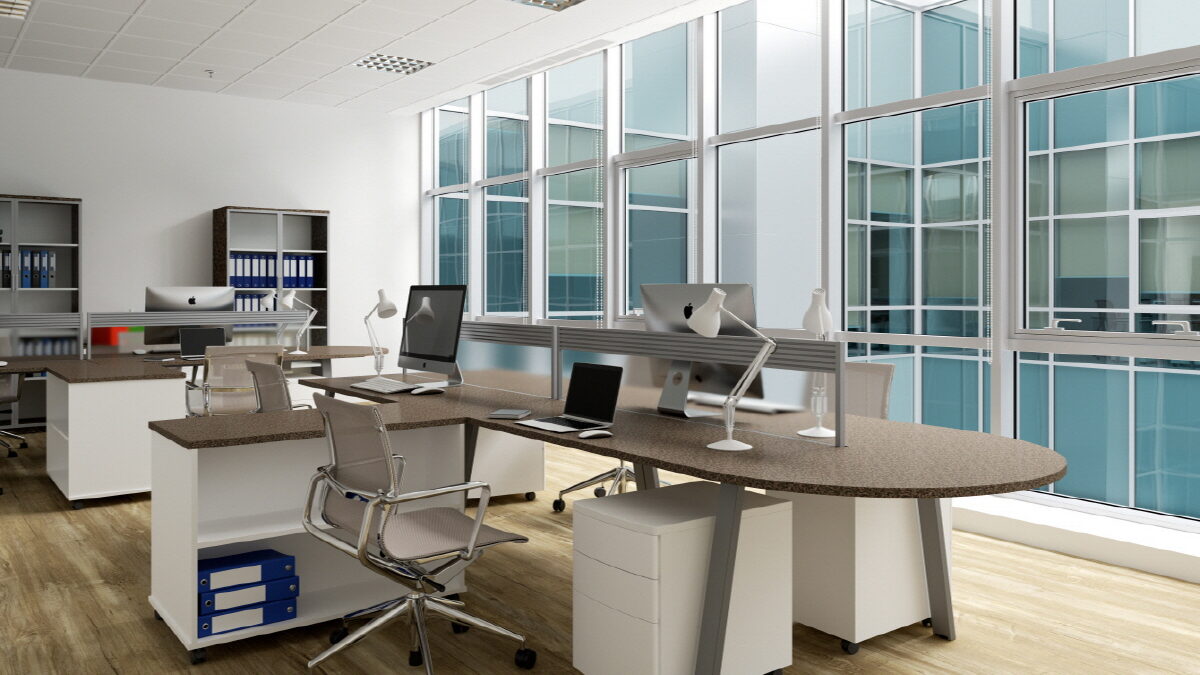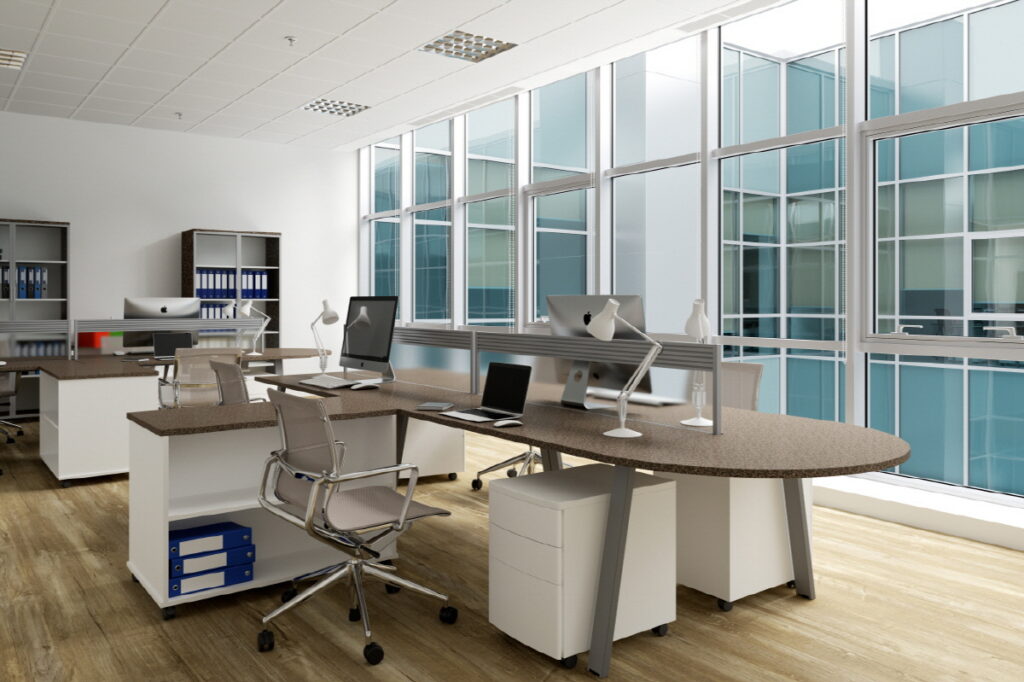
Many of us spend a lot of time in our offices, whether in a commercial space we share with others or a designated room or region in our house. How the office looks and functions directly impact our comfort, productivity, and attitude. When choosing materials for desks and worktop surfaces, including reception areas and collaboration spaces, you’ll want something that’s durable, easy to clean, damage-resistant, and aesthetically pleasing. In this article, we’ll look at two popular worktop materials and how they contribute to the workplace experience. Specifically, we’ll explore the advantages and disadvantages of granite and quartz countertop materials in the modern office environment.
What materials are the best for office countertops and worktops?
Office countertops, sometimes called worktops, are available in many sizes, shapes, colors, and designs to accommodate various types of work and interiors. The countertop material you choose will depend on design preferences and how you plan to use the surface; still, granite and quartz should be on your consideration list. Granite and quartz come in various styles and colors and can withstand vigorous wear and tear and continuous, repetitive use. Let’s look at each material and its advantages and disadvantages for workspace design.
Advantages & Disadvantages of Granite as an Office Countertop
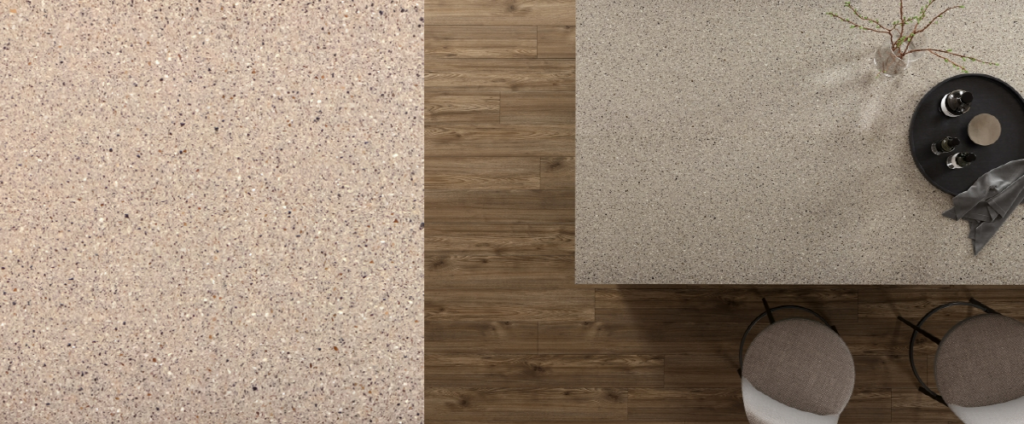
Granite is a popular countertop material in residential and commercial environments, and its natural beauty and long lifecycle make it a great option for many interior projects, including offices. Granite is an extremely durable natural stone, making it an excellent choice for any surface with repeat usage.
Granite has a unique, natural appearance and offers many performance advantages. It’s resistant to heat, scratches, and stains and relatively easy to clean and maintain. Granite is a premium material, so there may be more affordable options; it also requires regular sealing to maintain its performance properties.
· Advantages of Granite as an Office Countertop/Worktop
There are several reasons to consider granite. Its attractive appearance, broad product selection, easy maintenance, and durability, make it a popular choice. Let’s look at these advantages in more detail.
– Attractive Appearance
Granite countertops add a touch of elegance and luxury to office interiors. As a natural stone, each slab offers unique patterns and color variations. Colors include black, gray, white, pink, red, green, and blue, making it easy to find a countertop that complements various design styles and color palettes. Granite surfaces can be polished to a luxurious shine for a sophisticated appearance and provide a sleek, smooth countertop or worktop surface ideal for traditional and contemporary spaces.
– Extensive Selection
Granite is a natural resource available from numerous quarries across the globe, including the United States, Brazil, India, China, and several European countries. Granite is widely available and comes in multiple colors and patterns, each with a unique appearance. With so many choices, you will likely find a granite countertop to complement your design.
– Easy to maintain
Maintaining stone countertops, including granite, is a relatively straightforward process. Daily cleaning with warm soapy water is recommended to keep the surface clean and looking good. Granite is stain and scratch-resistant, but acidic substances should be cleaned up immediately, as they can damage the surface. Granite can be porous, allowing moisture and germs to penetrate the surface, so you’ll need to reseal your granite countertop every year to maintain its performance properties.
– Durable
Granite is highly durable, making it a good choice for high-demand worktop surfaces. Granite is one of the hardest, most durable natural stone materials, making it resistant to damage from daily activities. Granite is also heat resistant. However, granite isn’t indestructible. Granite can crack or chip if subjected to extreme force or impact from a heavy object. Acidic substances can also damage the surface if they sit for long periods, so it’s best to clean up spills as soon as possible. You’ll also need to commit to annual resealing to protect the material from potential stains and damages.
· Disadvantages of Granite as an office countertop
With granite, there are more advantages than disadvantages; still, there are some drawbacks you’ll want to consider, including costs and sealing requirements.
– Cost
Granite is one of the most affordable natural stone materials, but it’s also a premium product, so it may not be the best choice for budget-conscious projects. Depending on the quality and rarity of the stone, prices can range anywhere from $35 to $200 per square foot.
– Requires Sealing
As a natural stone, granite requires routine sealing. Most manufacturers recommend annual resealing. While skilled users may be able to do the resealing themselves, it’s best to use a professional fabricator to ensure you’re using the proper sealant and that it’s applied correctly.
Advantages & Disadvantages of Quartz as an Office Countertop
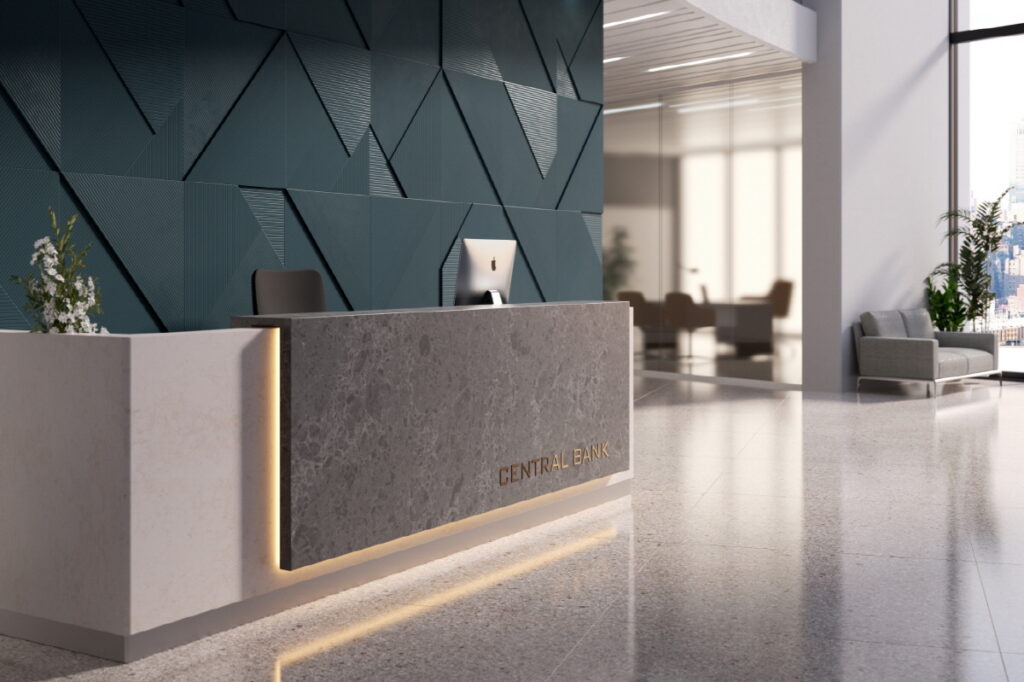
Quartz countertop, often called engineered stone, is made predominantly from quartz minerals — one of the earth’s most abundant and durable materials, mixed with high-quality polymer resins and colorfast pigments. The most desirable quartz products contain more than 90% natural quartz, making them as durable as other stone materials, including granite.
Quartz is durable, easy to maintain, and hygienic. Quartz countertops are available in many different colors and styles. While some quartz countertops resemble natural stone, including marble and granite, the material isn’t limited to what’s created in nature. You can find quartz countertops in various colors and styles for modern, urban, traditional, or contemporary design styles.
· Advantages of Quartz as an office countertop
– Attractive Appearance
Quartz combines the best of nature with the most advanced manufacturing practices, making it possible to create quartz in various colors and patterns. Whether you’re looking for a worktop resembling rare Calacatta marble or a more urban concrete look, there’s a quartz product to complement your design. You can also source quartz in solid colors and other modern styles.
– Attractive Appearance
Quartz combines the best of nature with the most advanced manufacturing practices, making it possible to create quartz in various colors and patterns. Whether you’re looking for a worktop resembling rare Calacatta marble or a more urban concrete look, there’s a quartz product to complement your design. You can also source quartz in solid colors and other modern styles.
– Hygienic
Like any high-use surface, worktops can be a breeding ground for germs and bacteria. Fortunately, quartz provides a nonporous surface that prevents mold, fungi, bacteria, and other contaminants from penetrating the surface and continuing to breed.
– Easy to maintain
Quartz doesn’t have to be resealed unlike natural stone, including granite. Routine cleaning with a soft cloth, pH-neutral cleaners, and water is all you need to maintain the countertop’s appearance. While quartz is stain-resistant, some stains, such as dried-on foods, require special attention. For more resistant stains, you’ll want to use a non-abrasive cleaner and avoid using any scrubbers that may scratch the surface. Since quartz is nonporous, you can soak a soft cloth with water and a mild cleanser and allow it to sit for a few minutes to loosen and address any persistent stains.
– Durable
Quartz is one of the hardest minerals on earth, and when it’s combined with the resin during the countertop manufacturing process, it creates a highly durable, nonporous surface. Quartz countertops are scratch and stain resistant and less likely to chip and crack when compared to natural stone, including granite. If damage does occur with your quartz worktop, it’s possible to buff out shallow scratches and repair deeper scratches with a filler.
· Disadvantages of Quartz as an office countertop
Like granite, quartz offers far more pros than cons; still, there are a few things you should be aware of before choosing quartz for your office countertop.
– Cost
Quartz is not the most affordable countertop option on the market; however, it’s generally less expensive than natural stone products. The price of quartz countertops depends on several factors, including the quality and size of the installation. The average price of quartz per square foot is usually between $40 to $85 per square foot, with premium quartz costing anywhere from $75 to $150 per square foot.
– Not Heat Resistant
One of the most significant drawbacks to quartz is that it can be damaged by prolonged exposure to high temperatures. That means you’ll want to protect your countertop or worktop from high heat, such as coffee cups, cup warmers, and other products, by using coasters and other protective barriers.
Office Countertop Assistance from LX Hausys
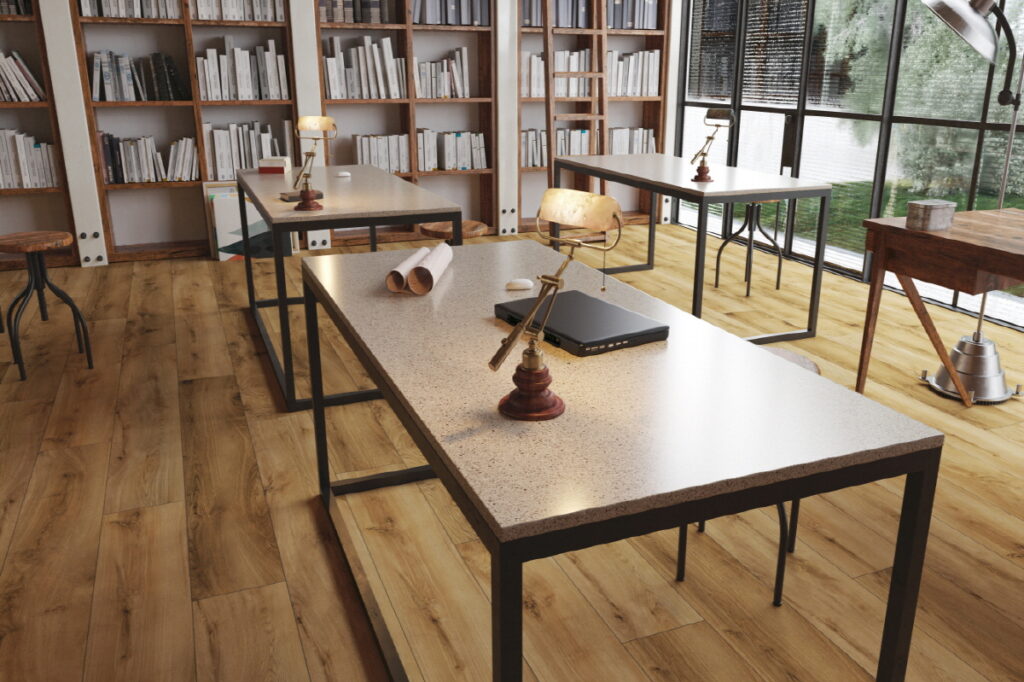
If you’re planning a new office space or replacing existing desks and countertops, our experts can help. LX Hausys offers a wide range of VIATERA quartz products to enhance any workplace. If you’re a homeowner or designer, contact us about your project, and someone will respond prompt

